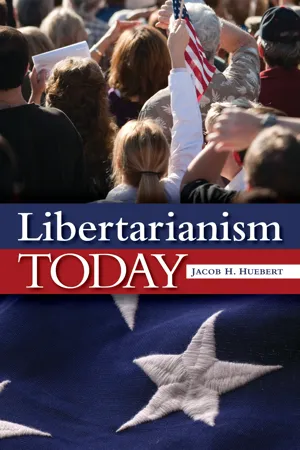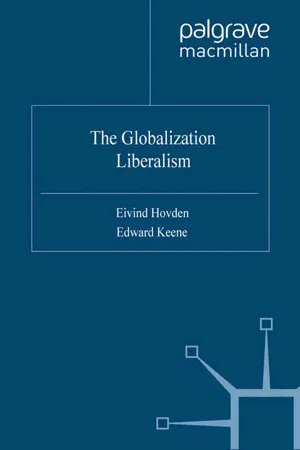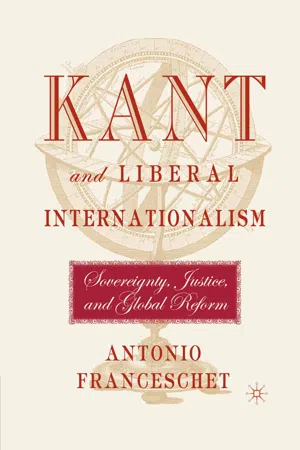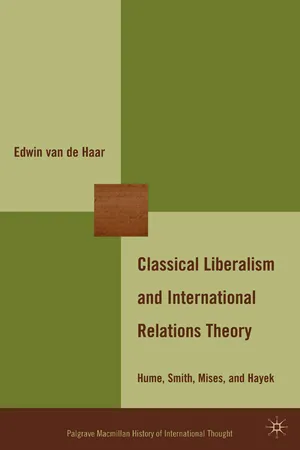Politics & International Relations
Libertarianism
Libertarianism is a political philosophy that emphasizes individual liberty and minimal government intervention in both personal and economic matters. It advocates for a free market economy, limited government regulation, and personal freedom, including the right to make choices without interference from the state. Libertarianism is characterized by a strong belief in individual rights and a skepticism of government authority.
Written by Perlego with AI-assistance
Related key terms
1 of 5
8 Key excerpts on "Libertarianism"
- eBook - PDF
- Alexander Moseley(Author)
- 2007(Publication Date)
- Continuum(Publisher)
CHAPTER 6 Libertarianism Standing on the edge of anarchy with its full expression of freedom but not desiring to give up government entirely is Libertarianism. The libertarian ideal of maximal individual freedom with a minimal state has long been part of political philosophy, although rarely has it been a dominant ideology either in mainstream thinking or in popular culture. We hear liberalism’s echoes concerning the inherent dignity of the individual or the freedom to live life as the individual chooses, and certainly Libertarianism is most intimately connected to the moral and political primacy of the individual. But it distinguishes itself from modern liberalism (sometimes calling itself classical lib-eralism), which it criticizes for being too statist and interventionist in presumption and prescription. Libertarianism emerged as a modern doctrine with the Leveller movement under John Lilburne in the seventeenth century, but its most influential time in history was in the late eighteenth to mid-nineteenth century. For many libertarians the American Constitution and the Bill of Rights stand as the political epitome of the libertar-ian ideal. The second half of the nineteenth century saw the classical liberal ideal give way to the emerging socialist and statist philoso-phies; two world wars promoted a resurgence of liberalism’s general ideals of freedom, especially in the human rights movements and the free trade doctrine of the postwar global institutions. Elements of it certainly rise to the fore every now and again in domestic politics, when voters believe that government is overstepping its legitimate boundaries in enforcing statist policies or prohibiting or curtailing individual rights. The driving force behind political Libertarianism is self-ownership, from which all other rights are deduced. ‘Every man has Property in 82 - eBook - PDF
- Jacob H. Huebert(Author)
- 2010(Publication Date)
- Praeger(Publisher)
But even those small-government libertarians (or ‘‘minarchists,’’ as they are sometimes called) believe that government cannot be trusted and must be watched vigi- lantly because it is so likely to exceed its boundaries. Having said all that, not everyone defines Libertarianism in exactly the same way. The definition just reviewed is a primary definition that has guided the modern libertarian movement, though, and it is the definition we will apply in this book. And for the most part, we will not concern ourselves much with the difference between no-government libertarians and minimal-govern- ment libertarians. Nor will we concern ourselves with how many exceptions to the basic libertarian rule one can make before that person no longer ‘‘counts’’ as a libertarian. But we will say now that a given policy can only be called lib- ertarian if it calls for reducing or abolishing the power of government over individuals, and that any policy that maintains or increases the government’s power is anti-libertarian. Libertarianism and Morality To accept Libertarianism, at least in its purest form, one has to agree with the non-aggression principle—the idea that it is wrong to defraud or use aggressive force against another person. Why would someone accept that idea? Libertarians do so for different reasons. Some believe in the non-aggression principle because they believe people have natural rights, either given by God or somehow inherent in man’s nature. Others do because their religion tells them that murdering and stealing are wrong. Others do, not because they believe in ‘‘rights,’’ but simply because they believe that following the non- aggression principle will lead to the greatest good for the greatest number. What Is Libertarianism? 5 It should be clear, then, that Libertarianism is not a complete moral philos- ophy or a philosophy of life. It is just a political philosophy, and one can come to Libertarianism from a variety of angles. - eBook - ePub
Selfish Libertarians and Socialist Conservatives?
The Foundations of the Libertarian-Conservative Debate
- Nathan W. Schlueter, Nikolai G. Wenzel(Authors)
- 2016(Publication Date)
- Stanford Economics and Finance(Publisher)
Instead of seeking liberty as one of many ends, Libertarianism considers liberty the highest political good. As Lord Acton wrote, “Liberty is not a means to a higher political end. It is itself the highest political end” (Acton 1907 [1877]). Likewise, economist F. A. Hayek explains that “we must show that liberty is not merely one particular value but that it is the source and condition of most moral values” (Hayek 2011 [1960], 6). From this flows a philosophy of limited government and the protection of individual rights. Libertarianism relies on government as protector of rights, to provide an umbrella within which individuals can peacefully go about their business, interact, and thrive. Libertarianism thus relies heavily on markets and civil society to supplement that which individuals cannot complete on their own and that which government cannot deliver without violating individual rights. Libertarianism is a political philosophy; it does not make claims beyond politics. Although other matters are very important to human flourishing, they are outside the realm of politics and thus outside the realm of Libertarianism. Social relations and interpersonal virtue (the way we treat each other) are political problems. Questions of intrapersonal virtue (the way we cultivate and treat ourselves), salvation, art, or beauty, are important to individual libertarians, but they are not of the political, and thus not of Libertarianism. To accuse Libertarianism of lacking an overall soteriology, eschatology, aesthetic theory, or life-encompassing metaphysics is akin to accusing biology of lacking a theory of opera. This does not mean that biologists deny the existence or importance of opera but that they lack anything meaningful to say about it from the standpoint of their discipline - Vic McCracken(Author)
- 2014(Publication Date)
- Bloomsbury Academic(Publisher)
6 Yet most people today cannot 6 Cf. Marvin Olasky, The Tragedy of American Compassion (Wheaton, IL: Crossway, 2008). Libertarianism and Social Justice: A Christian Approach 25 envision any sort of social organization in the absence of this relatively new institution. The truth is that the state in general, and individual states in particular, did not fall from heaven. They are historically contingent, and we do have examples of societies that organized themselves without anything that could reasonably be called a state. 7 The implementation of non-aggression throughout the various levels of government would bring many changes, and libertarians have intramural disagreements concerning strategies to make the transition, but nearly all agree that the following steps would be positive. 1) Military and foreign policy Libertarians condemn aggression against and provocation of other countries, advocating a “Golden Rule” in foreign policy. Nearly all liber-tarians condemned the wars against Iraq beginning in 1990 and 2003, the war in the Balkans throughout much of the 1990s, and similar attempts to impose American will around the world. They oppose military conscription. 2) Economic policy Libertarians support replacing the current coercive regulatory system with a stronger enforcement of property rights combined with a voluntary system of accreditation such as exists in many industries already. This includes the elimination of subsidies to businesses (“corporate welfare”) and all barriers to open competition in the marketplace. They also call for the repeal of legal tender laws to remove the state’s monopoly power over our money and for the eventual abolition of central banks such as the Federal Reserve. 3) Education Libertarians oppose the coercive nature of the public education system. They favor the repeal of compulsory attendance laws and the various restrictions on private and home schools.- eBook - PDF
- E. Hovden, E. Keene, E. Hovden, E. Keene(Authors)
- 2016(Publication Date)
- Palgrave Macmillan(Publisher)
Rather than try to develop a positive (as opposed to norma- tive and/or Utopian) theory of international relations, one alternative is to reflect on the development of liberalism as a political tradition or ideology and its application to international relations/world politics. While such an approach may seem to fall into the trap of looking back- ward, or even of appearing to be academic navel-gazing, the value of looking at the history of liberalism and liberal internationalism is that one can step outside the narrow confines of a particular debate, and see instead the wider view of continuity and change in such paradigms or debates in liberal theory. Liberalism and liberal internationalism have developed in part as responses to crises and criticisms as a result of The Harvard School of Liberal International Theory 49 political, economic, social, ideological and technological change, as well as a response to internal divisions and disputes. Liberals have con- sciously modified their doctrine to account for recent developments in world politics, and to respond to theoretical challenges from other per- spectives. Liberalism is above all a political project. The aim of liberalism has been the greater freedom of individuals in society. 47 As such, liberalism has in the past, as we know, been at the forefront of the opposition to privilege and arbitrary power. Liberalism initially emerged in the West as a creed and a movement against the continued domination of the landed classes. The so-called 'new liberalism' turned, at the end of the nineteenth century, against the newly powerful forces of monopoly capitalism. It advocated a renovated liberalism, which embraced the role of the state as part of the project of economic liberation, in order to permit greater freedom for the large majority of Western popula- tions. 48 This contrasts with the more recent neoliberal attacks on the inefficiencies, lack of democratic accountability and arbitrariness of the modern state. - eBook - PDF
Kant and Liberal Internationalism
Sovereignty, Justice and Global Reform
- A. Franceschet(Author)
- 2016(Publication Date)
- Palgrave Macmillan(Publisher)
In this LIBERAL INTERNATIONALISM AND THE KANTIAN "LEGACY" 69 section I argue that liberal internationalism is a multifarious project of global reform, one that is characterized by historically contingent and divergent perceptions of the nature of sovereign states and the kind of freedom these agents can plausibly afford the individual both within and across territorial boundaries. As Doyle notes, "There is no canonical description of liberalism."4 Most agree, however, that several related political commitments give it some coherence. These commitments are clustered around the preemi- nent goal of individual freedom but include justice, equality, progress, the rule oflaw, political participation, and peace. 5 The lack of a liberal canon is the result of profound disagreement among liberals on the connotations of these core concepts in addition to the proper configuration or priority of them. Thus the freedom ideal has varied historically among liberals and the national contexts in which they have sought political reform. 6 Additionally, various liberal notions of equality, from formal equality under the law to equality of opportunity and of outcome, are the grounds for systematic limitations on individual freedom that liberals have enter- tained in order to construct a coherent political position. Thus a so-called liberal orientation to political society and the institutions of the state has not produced a uniformly programmatic ideology, but rather a range of alternative conceptions about how best to define and promote such values. Liberalism is historically bound up with the coterminous rise of the modem state and the desire by certain social classes for freedom from the constraints of feudalism. The development of increasingly powerful, consolidated, and centralized states posed an immediate dilemma to the realization of freedom, one that is familiar from the above analysis of Kant. - eBook - PDF
Classical Liberalism and International Relations Theory
Hume, Smith, Mises, and Hayek
- Kenneth A. Loparo, Edwin van de Haar(Authors)
- 2009(Publication Date)
- Palgrave Macmillan(Publisher)
Undoubtedly, some will be surprised by the argument, because a significant number of current classical liberals have been rather happy to embrace the moral high ground in international affairs, as associated with many of the social liberal posi- tions to be discussed in the second part of this chapter. Therefore, they 126 ● Classical Liberalism and IR Theory will be surprised to learn that classical liberalism in international relations entails for example the rejection of the relation between peace and trade, or the calm acceptance of war as a regular institution in international affairs. Still, the theory outlined below is a consistent application of the classical liberal principles and views, which calls for reflection and then rejection of the previously held positions. Insofar that a number of classical liberals have taken a long hike from international reality, it is now time for them to face the difficulties and the ugliness often associated with world politics. Perhaps this process is made easier by the fact that a key aspect of classi- cal liberalism is its application of the same core principles to domestic and international politics, while acknowledging the differences between these two spheres of political action. The ultimate goal of classical liberalism in international affairs is the same as in domestic politics: to maximize indi- vidual freedom for all people in the world. The outline of the theory follows the presentation of the classical lib- eralism elements in chapter 2. This is a straightforward way to show that the theory is indeed classical liberal and that it follows the same bottom-up approach to politics. In the process, the relation with the Grotian position in English School theory is emphasized. In the second part of the chapter, the main differences with other liberalisms in IR theory are highlighted. The Individual and Freedom International relations are all about human action. - No longer available |Learn more
International Politics
Power and Purpose in Global Affairs
- D'Anieri, Paul D'Anieri(Authors)
- 2016(Publication Date)
- Cengage Learning EMEA(Publisher)
The politi-cal theorist John Locke and later liberals argued, contrary to Hobbes, that individuals could freely join together to form governments that would protect them from anarchy without resorting to authoritarianism. The limitation of state power and the guarantee of the rights of individuals are still the core of liberalism (which, in contemporary usage, is often simply called democracy ). The central philosophical insight of liberal international theory is that it is possible to overcome the worst aspects of the realist world. Indeed, liberals argue, because the world described by the realists is so dangerous, states and other actors have a powerful incen-tive to try to escape from that system, or at least to moderate its worst effects. Whereas realists are utterly pessimistic about the possibility of doing so, liberals are a bit more optimistic. They do not necessarily see people as “good” or inherently peaceful, but they do see people as being smart enough to recognize the problems created by international anarchy and to work to overcome them. The most prominent assumption shared by all liberals is that people are rational and understand their interests. This faith in human reason leads domestic liberals to believe that liberal democracy is the best form of government and leads international liberals to believe that rational, self-interested states and leaders can overcome the problems of anarchy. Liberalism is a much more diverse body of theories than realism, however, and is therefore more difficult to summarize coherently. This book highlights three different strands of liberal theory, each of which departs from realism in a different way and each of which focuses on a different level of analysis. One way to depart from realism is to rethink the implications of anarchy. This school, known as liberal institutionalism, agrees with realism that anarchy creates a security dilemma in which states’ efforts to gain security cause insecurity instead.
Index pages curate the most relevant extracts from our library of academic textbooks. They’ve been created using an in-house natural language model (NLM), each adding context and meaning to key research topics.







